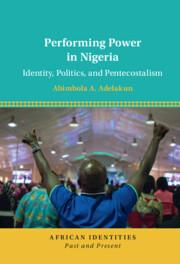Book contents
- Performing Power in Nigeria
- African Identities: Past and Present
- Performing Power in Nigeria
- Copyright page
- Dedication
- Contents
- Additional material
- Acknowledgments
- Introduction: Power Identity: Politics, Performance, and Nigerian Pentecostalism
- 1 Demons and Deliverance: Discourses on Pentecostal Power
- 2 “What Islamic Devils?!”: Power Struggles, Race, and Christian Transnationalism
- 3 “Touch Not Mine Anointed”: #MeToo, #ChurchToo, and the Power of “See Finish”
- 4 “Everything Christianity/the Bible Represents Is Being Attacked on the Internet!”: The Internet and Technologies of Religious Engagement
- 5 “God Too Laughs and We Can Laugh Too”: The Ambivalent Power of Comedy Performances in the Church
- 6 “The Spirit Names the Child”: Pentecostal Futurity in the Name of Jesus
- Conclusion: Power Must Change Hands: COVID-19, Power, and the Imperative of Knowledge
- Select Bibliography
- Index
- References
Select Bibliography
Published online by Cambridge University Press: 24 August 2023
- Performing Power in Nigeria
- African Identities: Past and Present
- Performing Power in Nigeria
- Copyright page
- Dedication
- Contents
- Additional material
- Acknowledgments
- Introduction: Power Identity: Politics, Performance, and Nigerian Pentecostalism
- 1 Demons and Deliverance: Discourses on Pentecostal Power
- 2 “What Islamic Devils?!”: Power Struggles, Race, and Christian Transnationalism
- 3 “Touch Not Mine Anointed”: #MeToo, #ChurchToo, and the Power of “See Finish”
- 4 “Everything Christianity/the Bible Represents Is Being Attacked on the Internet!”: The Internet and Technologies of Religious Engagement
- 5 “God Too Laughs and We Can Laugh Too”: The Ambivalent Power of Comedy Performances in the Church
- 6 “The Spirit Names the Child”: Pentecostal Futurity in the Name of Jesus
- Conclusion: Power Must Change Hands: COVID-19, Power, and the Imperative of Knowledge
- Select Bibliography
- Index
- References
Summary
- Type
- Chapter
- Information
- Performing Power in NigeriaIdentity, Politics, and Pentecostalism, pp. 246 - 279Publisher: Cambridge University PressPrint publication year: 2023
- Creative Commons
- This content is Open Access and distributed under the terms of the Creative Commons Attribution licence CC-BY-NC-ND 4.0 https://creativecommons.org/cclicenses/



